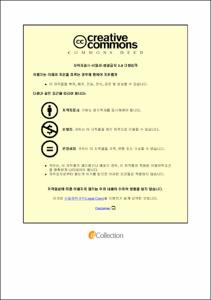감성지능과 직무태도, 조직성과의 관계 연구 -LMX의 조절효과-
- Alternative Title
- A Study on the Relationship between Emotional Intelligence, Job Attitude and organizational performance -LMX Moderation Effects -
- Abstract
- A Study on the Relationship between Emotional Intelligence, Job Attitude and organizational performance -LMX Moderation Effects -
Choi, Beom-Ho
Department of Business Administration, The Graduate School,
Pukyong National University
Abstract
The purpose of this study is to examine the relationship between emotional intelligence with the job attitude and organizational performance, given the circumstances that the members of organizations are emotional laborers and the importance of emotional approach toward organization management is emphasized.
In order to conduct the research, 625 questionnaires, completed by the workers from private and public organizations in six different industries in Busan, Gyeongnam province, and Ulsan, have been analyzed. SPSS package was used for frequency analysis, reliability analysis, and factor analysis, and regression analysis was used to test the hypothesis.
As results of the hypothesis test, first, the relationship between emotional intelligence and job engagement was significantly affected by the application of emotion, comprehension on self-emotion, and comprehension on other's emotion. Second, the relationship between emotional intelligence and job burnout was significantly affected by emotional control, application of emotion, and comprehension on self-emotion. Third, the relationship between emotional intelligence and organizational commitment, and the relationship between emotional intelligence and turnover intention were significantly affected by comprehension on self-emotion. Fourth, the relationship between job engagement and organizational commitment was significantly affected by the two factors of job engagement, job burnout was also revealed to significantly affect the organizational commitment. Fifth, the relationship between job engagement and turnover intention was significantly affected by the two factors of job engagement, and job burnout was also revealed to significantly affect turnover intention. Sixth, the mediation effect of job engagement on the relationship between emotional intelligence and organizational commitment was revealed to be significant, and also the mediation effect of job burnout on the relationship between emotional intelligence and turnover intention was revealed to be significant. Seventh, LMX did not show a moderating effect between emotional intelligence and job engagement's factor, commitment and involvement but LMX showed a moderating effect between emotional intelligence and job engagement’s factor, vitality. Eighth, LMX showed a partial moderate effect between emotional intelligence and job burnout was confirmed.
Based on the results of the research, the implications and further research suggesttions are as follows. First, the role of job burnout is revealed to be stronger than that of job engagement. It implies that in a research related to emotion, job burnout (a negative factor) is more important that job engagement (a positive factor), and the research should more focus on the negative factors as it is planned. Second, in order for the members of an organization to manage emotion through the appliction of emotional intelligence, it is effective to reinforce factors such as comprehension on self-emotion and emotion application. Third, the role of job burnout should be emphasized in the emotion management of the members of an organization.
This research can be used as a base date for further emotion management related researches by confirming the suitability of the integrated model of emotion related positive and negative factors. In addition, not only the factors used in this research should be used but also more various emotion related factors can be used in order to conduct further researches to integrate the relationships and interactions of positive and negative factors on emotion.
- Issued Date
- 2018
- Awarded Date
- 2018. 8
- Type
- Dissertation
- Publisher
- 부경대학교
- Alternative Author(s)
- Choi, Beom-Ho
- Affiliation
- 부경대학교 대학원
- Department
- 대학원 경영컨설팅협동과정
- Advisor
- 류태모
- Table Of Contents
- 목 차
제 1 장 서 론 1
제1절 연구의 배경 및 목적 1
제2절 논문의 구성 5
제 2 장 이론적 배경 7
제1절 감성지능 7
1. 감성지능의 개념 7
2. 감성지능에 대한 선행연구의 고찰 10
제2절 직무태도 14
1. 직무열의의 개념 14
2. 직무열의에 대한 선행연구의 고찰 17
3. 직무소진의 개념 19
4. 직무소진에 대한 선행연구의 고찰 22
제3절 리더-구성원 교환관계 26
1. 리더-구성원 교환관계의 개념 26
2. 리더-구성원 교환관계에 대한 선행연구의 고찰 30
제4절 조직성과 33
1. 조직몰입의 개념 33
2. 조직몰입에 대한 선행연구의 고찰 37
3. 이직의도의 개념 38
4. 이직의도에 대한 선행연구의 고찰 40
제 3 장 연구설계 42
제1절 연구모형 42
제2절 연구가설 43
1. 감성지능과 직무열의/직무소진 43
2. 감성지능과 조직몰입/이직의도 45
3. 직무열의/직무소진과 조직몰입/이직의도 46
4. 직무열의/직무소진 매개효과 49
5. LMX 조절효과 51
제 4 장 실증연구 방법 54
제1절 표본선정 및 자료수집 54
제2절 표본의 특성 54
제3절 변수의 조작적 정의 56
1. 감성지능 56
2. 직무열의 57
3. 직무소진 58
4. 리더-구성원 교환관계(LMX) 59
5. 조직몰입 60
6. 이직의도 61
제4절 설문지 구성 61
제5절 분석방법 63
제 5 장 실증연구 결과 64
제 1 절 타당성 및 신뢰성 분석 64
1. 독립변수의 신뢰성 및 타당성 검증 65
2. 종속변수 및 조절변수의 신뢰성 및 타당성 검증 66
제 2 절 상관관계분석 68
제 3 절 회귀분석을 통한 가설검증 70
제 6 장 결론 및 토의 94
제1절 연구결과의 요약 94
제2절 연구의 시사점 96
제3절 연구의 한계 및 향후 연구방향 99
참고문헌 100
부록(설문지) 130
- Degree
- Doctor
- Files in This Item:
-
-
Download
 감성지능과 직무태도, 조직성과의 관계 연구 -LMX의 조절효과-.pdf
기타 데이터 / 1.09 MB / Adobe PDF
감성지능과 직무태도, 조직성과의 관계 연구 -LMX의 조절효과-.pdf
기타 데이터 / 1.09 MB / Adobe PDF
-
Items in Repository are protected by copyright, with all rights reserved, unless otherwise indicated.